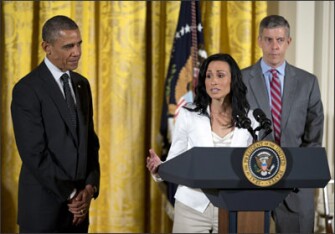
President Barack Obama and U.S. Secretary of Education Arne Duncan again appealed to Congress to come up with the money to pay for more counselors, social workers, and psychologists in schools during a national conference on mental health at the White House on today.
Obama promised to launch a “national conversation” on mental health after the shootings at Sandy Hook Elementary in Newtown, Conn. in December.
“We all know someone who has struggled with or will struggle with mental health in their lives,” Obama said to a room packed with mental health care professionals, advocates, and celebrities including Glenn Close and Bradley Cooper. “We whisper about mental health issues. The brain is a body part, too.”
He also emphasized that mental illness is often incorrectly linked to violence. But the Newtown shootings, which led to the deaths of 26 students and staff at Sandy Hook, were rarely mentioned at the day’s events.
Close later talked of the battles and stigma her family has faced when dealing with mental illness. And Cooper talked about how his eyes opened to mental health care issues after portraying a man being treated for bipolar disorder in last year’s film, “Silver Linings Playbook.”
“We’ve got to do a better job of recognizing mental health [problems] in our children,” Obama said, especially because so many mental health disorders can be detected, and treatment can begin, in children and adolescents.
The administration shared the launch of the new mentalhealth.gov website, which carries tools and information about mental health, signs of mental illness, discussing mental health, and how to get help.
Obama’s plans to add up to 1,000 new school resource officers and school counselors would require $150 million. Providing mental health awareness training to teachers would cost another $15 million, and his proposal to train more than 5,000 additional mental health professionals to serve students and young adults would cost $50 million.
“If Congress can come together on anything, we hope it’s this,” Duncan said later in the day.
The day’s events highlighted some nonprofit and corporate efforts to promote mental health care, link students and adults—including veterans—with services, and provide lifelines in a moment of need. For example, the DoSomething.org/Crisis Text Line would enable students to text a message for help and get feedback from a trained mental health care professional in minutes. It’s set to launch in Chicago and El Paso, Texas, in August and be available nationwide sometime in 2014. MTV noted the launch of its Half of Us and Love is Louder campaigns, which share celebrity stories of mental illness and encourage young people to be supportive of friends who express feelings that indicate a mental health issue.
This fact sheet lists a host of commitments from other groups, including from several education associations.
The National Association of Secondary School Principals has asked its membership of 25,000 middle and high school principals and assistant principals to gather for an assembly on mental health awareness by the end of 2013. And the National Parent Teacher Association and the National Association of School Psychologists are joining forces on a webinar for members regarding mental health awareness. The National Association of School Nurses is developing an online continuing education program on behavioral health for school nurses and sending members an evidence-based checklist of steps to identify early signs of mental health problems and refer students and their families to treatment.
Also, the YMCA and the American Psychological Association are working to develop educational tools and resources to help 18,000 full-time Y staff and 49,000 summer employees who work with children, to identify the signs of depression and other mental health problems in youth and refer them to appropriate resources.
“There’s a whole body of research around mental health,” Duncan said. “As a country we have not gotten behind this issue. Clearly, there is a tremendous amount of work ahead of us.”
PHOTO: President Barack Obama and Secretary of Education Arne Duncan listen as Janelle Montaño shares her story of dealing with mental health issues during the opening of the White House mental health conference on Monday.—Evan Vucci/AP